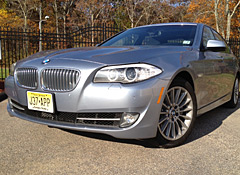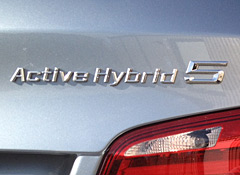You may not have heard, but BMW now offers its luxurious 5 Series sedan as hybrid. We recently spent a few days with a BMW ActiveHybrid 5 to see if it lives up to the promise and share our first impressions.

The car was borrowed from BMW for a fee. The German carmaker's latest foray into the world of hybrids behaves a lot like the slick 535i we tested in 2010, and it uses the same smooth-and-punchy turbocharged 3.0-liter inline-six-cylinder engine. With its electric drive motor, combined horsepower climbs from 300 to 335 hp. "Hybridizing" this 5 Series isn't cheap. This car, starting at $61,100, stickers for $8,000 more than a regular 535i.
The hybrid brings all the virtues and vices of the regular 5 Series: a comfortable ride, quiet cabin, and impeccable interior along with complex controls and somewhat vague steering.
We've also noticed that the extra money doesn't buy much of a fuel-economy gain. We've been observing an average of 25.5 mpg in mixed driving, compared with the 23 mpg overall from our tested 535i. That 2.5-mpg gain is much less than we measured with our tested Toyota Camry sedans: The Camry hybrid got 11 mpg more than the regular four-cylinder Camry. Jumping to the upscale category, a Mercedes-Benz E-Class diesel registered 26 mpg overall in our tests and doesn't cost appreciably more than a conventional V6-powered E-Class, which got 21 mpg.
Thrift is not the first thing that comes to mind regarding BMW, but it's worth noting that the relatively frugal $47,500 528i, with its turbocharged, 2.0-liter four-cylinder engine, gets better fuel economy than BMW's Hybrid—24 mpg city/34 mpg highway, according to the EPA, versus 23/30. And, you don't lose the fold-down rear seat feature that you must sacrifice to get the Hybrid. If fuel economy were the name of the game, then maybe that's the car BMW should have hybridized.

The ActiveHybrid 5 uses a small .675-kWh lithium-ion battery sandwiched between the rear seat and trunk. It can propel itself on electric power alone at up to about 15 mph with a light throttle. The car is also designed to shut off the engine when coasting, once below about 40 mph. Fortunately, the automatic start/stop at idle is unobtrusive enough—which was not our experience with our last tested 3 Series. In that car, start/stop lacked smoothness, shaking the car when it shut off in a decidedly non-luxurious manner. BMW uses this same technology for hybrid versions of the 3 and 7 Series. Experience gained there will be used as the springboard for future plug-in hybrids and pure electrics such as the lease-only 1 Series electric.
Clearly, as a hybrid, a 10-percent fuel-economy gain at best is nowhere near the roughly 30-percent improvement we see with the Camry Hybrid. Instead, it's more in line with the "eAssist" mild hybrid you get with a Buick LaCrosse, which in our tests improved fuel economy from 23 to 26 mpg. So with all due respect to BMW's technical wizardry, we wonder why they bothered.





